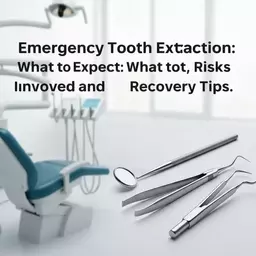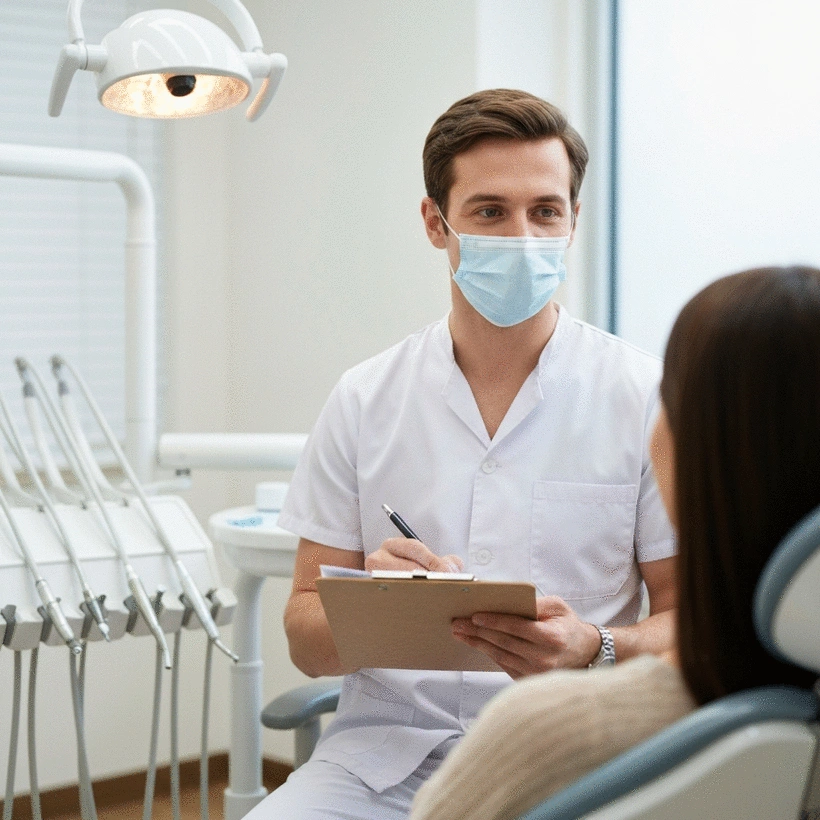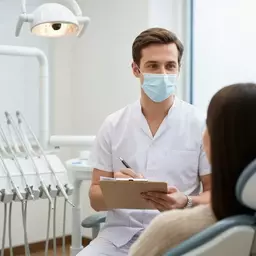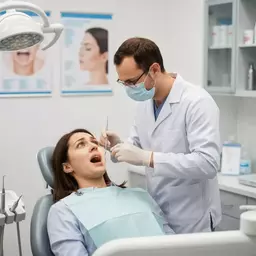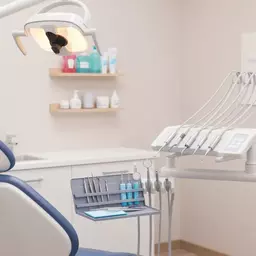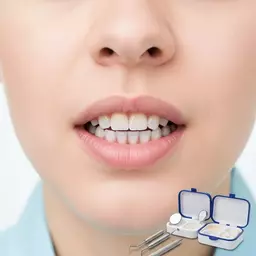Calming Toothache Before Emergency Visit

Are you aware that tooth pain can take many forms, and understanding those variations is crucial for timely dental care? This guide breaks down the common symptoms, causes, and when to seek help from a professional. Let’s explore how to take control of your dental health!
What You Will Learn
- Different types of tooth pain indicate specific dental issues, such as cavities or infections.
- Common triggers for toothaches include gum disease, bruxism, and food particles trapped between teeth.
- Signs that necessitate immediate dental care include severe pain, visible swelling, and persistent bleeding.
- Understanding the dental visit process can alleviate anxiety and prepare you for effective treatment.
- Post-treatment care and preventive measures are essential for maintaining your oral health.
Understanding Toothache: Visualizing Causes & Emergency Signals
This visual summarizes the common causes of toothaches and key indicators for seeking emergency dental care, as highlighted in the article.
Common Toothache Triggers
- ✓ Cavities
- ✓ Gum Disease
- ✓ Infections (Abscesses)
- ✓ Bruxism (Teeth Grinding)
Symptoms Requiring Urgent Care
- ⚠ Severe, Persistent Pain
- ⚠ Swelling (Gums/Face)
- ⚠ Uncontrolled Bleeding
- ⚠ Knocked-Out Tooth
Types of Tooth Pain
- ● Sharp Pain (Cavities, Exposed Nerves)
- ● Dull Ache (Gum Issues)
- ● Throbbing Pain (Infection, Abscess)
- ● Temp. Sensitivity (Decay, Erosion)
Post-Treatment Oral Care
- ✓ Follow Dentist's Instructions
- ✓ Schedule Follow-Up Appts
- ✓ Strict Oral Hygiene Routine
- ✓ Discuss Preventive Care
Understanding Toothache: Common Causes and Symptoms
Toothaches can be quite distressing and often signal that something is amiss with your dental health. At eDentistNearMe, we understand how essential it is to identify the root cause of your discomfort. Whether it's a nagging ache or sharp pain, knowing the different types of tooth pain can help you seek the right care efficiently.
Have you ever wondered why certain tooth pains manifest differently? The types of tooth pain can vary based on the underlying cause, including dental cavities, gum disease, or even infections.
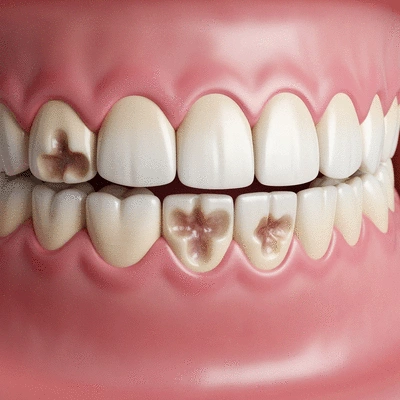
Identifying the Types of Tooth Pain
Understanding the nature of your tooth pain is crucial. Here are some common types you might experience:
- Sharp Pain: Often associated with cavities or exposed nerves.
- Dull Ache: Typically related to gum issues or other underlying conditions.
- Throbbing Pain: Can indicate an infection or abscess.
- Sensitivity to Hot or Cold: Usually a sign of tooth decay or enamel erosion.
Recognizing these symptoms early can lead to better outcomes. If you experience persistent pain, don’t hesitate to connect with a trusted emergency dentist through our platform.
What Triggers a Toothache?
There are various triggers for toothaches, and identifying these can help you avoid future discomfort. Some common triggers include:
- Cavities: Decay that creates openings in your teeth.
- Gum Disease: Inflammation that can cause pain and tenderness.
- Infections: Bacterial infections can lead to abscesses, causing intense pain.
- Bruxism: Grinding your teeth can lead to wear and discomfort.
Taking note of what seems to trigger your toothache can provide valuable information for your dentist. If these triggers resonate with your experience, it’s time to act!
Common Toothache Triggers: Identifying the Source
Understanding the source of your tooth pain is imperative for effective treatment. Here are some common sources:
- Food Particles: Sometimes, trapped food can lead to pressure and discomfort.
- Dental Work: Recent procedures may cause temporary sensitivity.
- Temperature Sensitivity: Hot or cold foods can provoke pain in sensitive teeth.
- Trauma: Injuries to the jaw or teeth can lead to acute pain.
Being aware of these triggers can help you understand your pain better. If any of these symptoms sound familiar, remember that at eDentistNearMe, we’re here to connect you with emergency dental care whenever you need it!
Pro Tip
Did you know? Keeping a dental journal can help you track your tooth pain and its triggers effectively. Documenting when the pain occurs, its intensity, and any associated activities can provide invaluable information for your dentist, leading to a more accurate diagnosis and treatment plan.
Seeking Professional Help: When to Visit an Emergency Dentist
Knowing when to seek emergency dental care can make all the difference when you're in pain. At eDentistNearMe, we understand how daunting it can feel to make that call. But trust me, recognizing the signs that you shouldn’t ignore can lead to better outcomes for your dental health!
So, when should you pick up the phone? If you experience any of the following symptoms, it's crucial to reach out to a dentist immediately:
- Severe tooth pain that doesn't subside
- Swelling in the gums or face
- Bleeding from the mouth that won't stop
- A knocked-out tooth or tooth that has been dislodged
- Infections around the gum area
Each of these signals indicates that professional help is necessary. Ignoring them can worsen the situation, possibly leading to more severe complications. Remember, we're here to connect you with trusted emergency dentists who can provide the care you need 24/7.
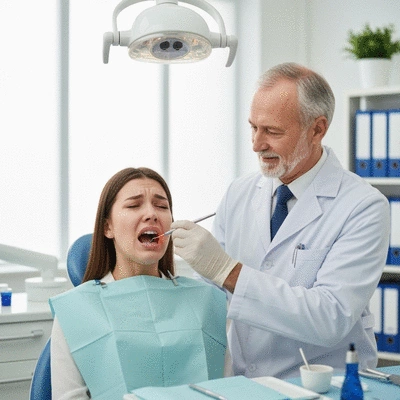
Signs You Should Not Delay Dental Care
Sometimes, the pain can feel mild, leading you to think it’s not urgent. However, certain signs are red flags that should prompt immediate action:
- Persistent Pain: If tooth pain lingers despite taking over-the-counter medication, don’t wait.
- Visible Swelling: Swelling, especially around the mouth or face, can indicate a serious infection.
- Fever or Symptoms of Infection: If you also have a fever, it may suggest an underlying issue.
Each of these symptoms can lead to significant dental problems if not addressed promptly. We’re always here to help you find the right professional to tackle these issues head-on!
What to Expect During Your Emergency Dental Visit
Preparing for an emergency dental visit can ease some of your anxiety. Here’s what typically happens during your appointment:
- Your dentist will conduct a thorough examination to identify the source of your pain.
- X-rays may be taken to get a clearer picture of what's going on beneath the surface.
- Depending on the diagnosis, you may receive immediate treatment or a plan for further care.
Understanding this process can make it a bit less intimidating. The goal is to ensure you leave with relief and a solid plan for your dental health moving forward.
Understanding the Role of Your Dental Assistant During Emergencies
During your visit, you'll likely meet a dental assistant who plays a vital role in your care. They are there to:
- Help you feel comfortable and relaxed during your appointment
- Assist the dentist in procedures, ensuring everything runs smoothly
- Provide you with important information regarding post-treatment care
Just remember, communication is key! Don’t hesitate to ask questions or express any concerns you may have. Together, we can navigate your dental emergency effectively!
Maintaining Oral Health After Immediate Relief
Once you've received treatment, it's crucial to focus on maintaining your oral health. Here are some tips for ongoing dental care post-treatment:
- Follow your dentist's instructions on any medications or care plans
- Schedule follow-up appointments to monitor your recovery
- Adopt a strict oral hygiene routine: brush, floss, and rinse regularly
At eDentistNearMe, we believe that ongoing care is essential for your overall dental health. If you have any questions or need assistance, we’re here to help!
Engaging with Your Dentist: Discussing Preventive Care Options
Your relationship with your dentist should go beyond just emergency visits. It's important to engage with them about preventive care options:
- Ask about the best dental care products for your specific needs
- Discuss lifestyle changes that can support your oral health
- Inquire about regular check-ups and any necessary treatments
Having those conversations can empower you to take charge of your dental health journey!
Choosing the Right Dental Care Products for Home Use
Don't underestimate the power of proper dental care products! Here's a quick checklist of what to look for:
- Fluoride toothpaste for cavity prevention
- Soft-bristled toothbrushes to protect sensitive gums
- Interdental brushes or floss for thorough cleaning
Investing in quality products can help you maintain your healthy smile for years to come. If you’re unsure where to start, your dentist can guide you in making the best choices!
Your Path Forward: Taking Control of Your Dental Health
Taking control of your dental health means being proactive. By recognizing when to seek help and following up with preventive care, you can significantly reduce your chances of future emergencies.
At eDentistNearMe, we're always here to support you on your dental journey! If you have any questions or want to share your experiences, feel free to reach out.
Frequently Asked Questions (FAQs)
- Q: What are the main types of tooth pain?
- A: The main types of tooth pain include sharp pain (often from cavities or exposed nerves), dull ache (gum issues), throbbing pain (infections/abscesses), and sensitivity to hot or cold (decay/erosion).
- Q: What commonly triggers a toothache?
- A: Common triggers for toothaches are cavities, gum disease, bacterial infections leading to abscesses, bruxism (teeth grinding), trapped food particles, recent dental work, temperature sensitivity, and trauma to the teeth or jaw.
- Q: When should I seek immediate emergency dental care?
- A: You should seek immediate emergency dental care if you experience severe, persistent tooth pain, visible swelling in the gums or face, uncontrolled bleeding from the mouth, a knocked-out or dislodged tooth, or signs of infection like fever.
- Q: What should I expect during an emergency dental visit?
- A: During an emergency dental visit, your dentist will perform a thorough examination, possibly take X-rays, and provide immediate treatment or develop a plan for further care to address the issue causing your pain.
- Q: How can I maintain my oral health after receiving treatment for a toothache?
- A: After treatment, it's crucial to follow your dentist's instructions, attend scheduled follow-up appointments, and maintain a strict oral hygiene routine that includes regular brushing, flossing, and rinsing. Discussing preventive care options and choosing appropriate dental products with your dentist is also vital.
Recap of Key Points
Here is a quick recap of the important points discussed in the article:
- Types of Tooth Pain: Be aware of different pain types, such as sharp pain indicating cavities or throbbing pain signaling infections.
- Common Triggers: Identifying triggers like cavities, gum disease, and bruxism can help prevent future discomfort.
- When to Seek Help: Symptoms like severe pain, swelling, or bleeding warrant immediate dental attention. You can find more information on managing dental pain from reputable sources like the American Dental Association.
- Post-Treatment Care: Follow your dentist's instructions and maintain a strict oral hygiene routine for ongoing health.
- Preventive Care: Regular check-ups and discussions with your dentist about prevention can significantly reduce emergency visits.

